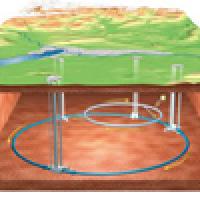
CERN needs you!
Here's your chance to venture to the frontiers of physics using your very own computer. This week CERN began public testing of LHC@home 2.0, a project that enlists the computing power of volunteers to help simulate high-energy collisions of protons in the Large Hadron Collider (LHC). Physicists will be looking out for discrepancies between the simulated data and what is actually observed at the LHC. These may indicate flaws in the computer simulations or the underlying theory; most excitingly they may indicate that a totally new phenomenon of nature has been discovered.

The LHC at CERN. Image © CERN.
As the CERN announcement puts it, "Volunteers can now actively help physicists in the search for new fundamental particles that will provide insights into the origin of our Universe, by contributing spare computing power from their personal computers and laptops." The extra computing power is needed because the calculations used to model multi-particle dynamics are incredibly complex.
LHC@home 2.0 is an updated version of a project first launched in 2004. "At that time, doing full-fledged simulations of particle collisions was beyond the scope of volunteer computing," says the LHC@home website. "But the evolution of computer software and hardware, and in particular the use of virtual machine technology, has enabled a breakthrough."
The new platform is one of a series of projects and events organised by the Citizen Cyberscience Centre, a partnership between CERN, the UN Institute for Training and Research and the University of Geneva, to promote volunteer-based science during the European Year of Volunteering 2011. "Citizen cyberscience is a grass-roots movement which challenges the assumption that only professionals can do science," said Pierre Spierer, Vice-Rector for Research of the University of Geneva. "Given the right tools and incentives, and some online training, millions of enthusiastic volunteers can make a real difference, contributing to significant scientific discoveries."
While LHC@home will benefit the researchers at CERN, it's hoped that citizen cyberscience may transform the way science is done in less affluent places. Sergio Bertolucci, Director of Research and Scientific Computing at CERN, said: "The biggest benefits of citizen cyberscience are for researchers in developing regions who have limited resources for computing and manpower. Online volunteers can boost available research resources enormously at very low cost. This is a trend we are committed to promote through the Citizen Cyberscience Centre".
To find out how to put your computer in the service of science, visit the LHC@home website or the Citizen Cyberscience Centre.
To find out more about the LHC and the science behind it, read the Plus articles: